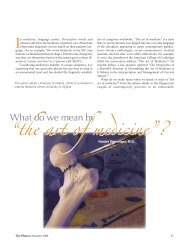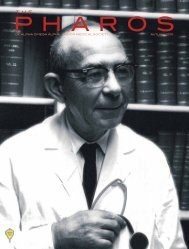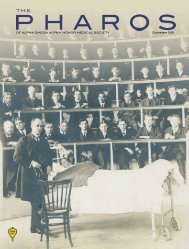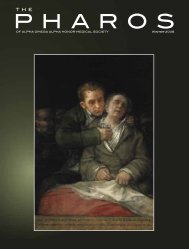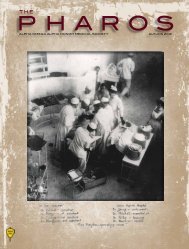Download The Pharos Winter 2011 Edition - Alpha Omega Alpha
Download The Pharos Winter 2011 Edition - Alpha Omega Alpha
Download The Pharos Winter 2011 Edition - Alpha Omega Alpha
You also want an ePaper? Increase the reach of your titles
YUMPU automatically turns print PDFs into web optimized ePapers that Google loves.
dodges Jake’s questions about rumors that KZI is on the brink<br />
of insolvency, saying, “Are we going under? That’s the wrong<br />
question. Who isn’t?” He ends the conversation by giving Jake<br />
a $1.45 million bonus, telling him to enjoy it. Jake uses part<br />
of it to buy Winnie an engagement ring (although he knows<br />
she’s against marriage) and to go out partying. He decides to<br />
plow the rest into KZI despite a friend’s warning that the firm,<br />
having kept subprime mortgage toxic debt off its books, is in<br />
danger of collapse.<br />
Enter Bretton James (Josh Brolin), the CEO of Churchill<br />
Schwartz, a fictional firm meant to represent a combination<br />
of Goldman Sachs and J.P. Morgan. By refusing to support a<br />
bailout for KZI, he engineers its destruction as a payback for<br />
Zabel’s not bailing out Churchill Schwartz eight years before<br />
under similar circumstances. <strong>The</strong>re are ominous meetings of<br />
the Federal Reserve Commission in New York as Zabel unsuccessfully<br />
tries to trade on old loyalties and friendships by<br />
pleading his case before the group that holds his fate in their<br />
hands. <strong>The</strong>re are a couple of great scenes on the Upper West<br />
Side in Central Park and the subway, involving a distraught<br />
Zabel and Jake.<br />
Re-enter Gekko as he goes on the lecture circuit to Fordham<br />
Business School to publicize his book. He tells the students<br />
that “money is a bitch that never sleeps and she is jealous.” He<br />
reiterates his old axiom that greed is good, but too much is<br />
not, and that greed is legal. He notes that forty percent of the<br />
nation’s profits come from financial services, not production<br />
of goods, principally involving what he calls “banks on steroids.”<br />
Jake goes up to him after the lecture and tells him that<br />
he is engaged to Winnie. <strong>The</strong>y ride the subway together and<br />
forge a quid pro quo arrangement in which Gekko helps Jake<br />
unravel the steps leading to the destruction of KZI in return<br />
for trying to reconcile him with his daughter. This grafting<br />
of a love affair, such as it is, onto the picture’s main theme of<br />
the convoluted machinations of the Wall Street traders never<br />
really works. It seems like an attempt to reach a younger audience<br />
while showing that Gekko has some humanity (although<br />
not much). He is not averse to duping his daughter and Jake<br />
to get back his $100 million, which he promptly turns into $1<br />
billion, showing that he hasn’t lost his old touch.<br />
<strong>The</strong> film is filled with what might be called “inside baseball,”<br />
with references to the cutthroat side of the financial<br />
world with its own arcane language of credit default swaps,<br />
hedge funds, derivatives, bundling subprime mortgages, and<br />
toxic debt. At the time, these terms were totally unfamiliar to<br />
the majority of the public whose retirement funding depended<br />
on their effects on the markets. <strong>The</strong>y were also ignored by the<br />
numerous public watchdogs at the Federal Reserve, the relevant<br />
Congressional committees, and the SEC until the crisis<br />
exploded into public consciousness in 2008. <strong>The</strong>re are also<br />
the references to banks being “too big to fail” and their being<br />
given bailouts in which they are awarded 100 cents on the<br />
dollar while investors are short-changed. This illustrates the<br />
concept of “moral hazard”—someone takes your money and<br />
acts differently when insulated from risks than he would if he<br />
were fully responsible for losses. <strong>The</strong> comment in the film is<br />
that it is “unethical but not illegal.”<br />
Though long, the film held my interest throughout. What<br />
is particularly good about it is the acting, first by Douglas<br />
who looks as old, tired, and sick as he is in real life. Look for<br />
another Best Actor Oscar, possibly posthumously. Next is the<br />
outstanding supporting cast. Frank Langella is great as an old<br />
Lion being eaten alive by the unscrupulous young shark played<br />
by Josh Brolin. Eli Wallach is also great as Jules Steinhardt, another<br />
old Lion, who looks half-dead but is still in control, just<br />
as he was in <strong>The</strong> Godfather until he got bumped off by that<br />
cannoli. As he drops his little pearls, he emits a little whistle,<br />
one of the best touches in the film that I have to believe he improvised.<br />
Susan Sarandon is less effective as Jake’s mother, who<br />
is forever cadging money from her son for failed real estate<br />
schemes. Also look for Oliver Stone, who pulled a Hitchcock<br />
by appearing in both films as a trader. <strong>The</strong>re are many shots<br />
of New York’s buildings and a little taste of sex, drugs, and<br />
materialistic excess as the young lions get outrageous bonuses.<br />
Oliver Stone is one of my bête noirs. His outlandish attempts<br />
to rewrite history, his admiration for Castro and Chavez, and<br />
his inane pronouncements characterizing Hitler as simply a<br />
“product of his time” and extolling the “good” side of Stalin,<br />
have discredited him in my view. Still, I must commend him<br />
for clearly being ahead of the curve with these two films.<br />
He was filming the first one in 1985 and released it in 1987,<br />
when the financial crash occurred. As for the second, he was<br />
promptly on the case of the 2008 debacle in that the film began<br />
shooting that year. He also has highlighted the fact that<br />
wealth in America was once based on the production of goods.<br />
That has changed in the computer age, when information<br />
can make or break individuals and companies and paper has<br />
replaced tangible goods as the currency of wealth. He presumably<br />
learned that lesson from his father, who was a broker at<br />
Shearson Lehman into the 1980s. Maybe he should give up<br />
making pictures and be “the canary in the coal mine” in the<br />
corner at those federal watchdog group meetings.<br />
Conviction<br />
Starring Hilary Swank, Sam Rockwell, Minnie Driver, Juliette<br />
Lewis and Peter Gallagher.<br />
Directed by Tony Goldwyn. Rated R. Running time 107 minutes.<br />
I<br />
’m conflicted about Conviction. I attended a screening with<br />
a friend and if I had driven my own car, I would have been<br />
gone after the first fifteen minutes. If I had been watching it<br />
at home, I certainly would have gonged it. Here’s why. <strong>The</strong><br />
film opens in 1980 with a long handheld camera sequence<br />
panning over a grisly, blood-soaked murder scene in Ayer,<br />
Massachusetts, where a woman named Katharina Brow had<br />
<strong>The</strong> <strong>Pharos</strong>/<strong>Winter</strong> <strong>2011</strong> 43






